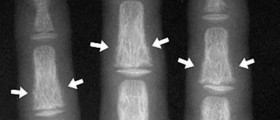
Hypercalcemia is medical disorder that features with increased levels of calcium in blood. Every digit that exceeds the limit of 2.6 mmol/L is considered as hypercalcemia. This imbalance of calcium is common for majority of diseases. If the level of calcium reaches 14 mg/dL it leads to acute symptoms and signs. Still the problem needs to be found as soon as possible as due to high level of calcium severe damage to many organs may occur.
Hypercalcemia is usually caused by tumors of parathyroid gland. This tiny little gland is located next to thyroid gland in the neck. In this case hypercalciemia is caused by increased absorption of calcium from intestines due to hyper function of parathyroid gland. However there are other reasons for increased levels of calcium in blood. All of them are classified as non-primary hyperparathyroidism- mediated hypercalcemia. They include malignacies (especially osteolysis in case of bone metastases), granulomatous diseases, increased intake of calcium supplements, familiar hypocalciuric hypercalcemia, chronic hemodialysis, chronic liver disease, the diseases of endocrine glands, chronic usage of certain medications and so.
The symptoms mainly depend of the general health of the patient as well as the speed of the entire process of calcium increase. Slight elevation of calcium in blood produces no symptoms. However in case of higher calcium levels the most common symptoms and signs includes: nausea and vomiting, changes in mental status, constipation. Pain in abdomen in loins may point to kidney stones which can be a consequence of increased levels of calcium.
In severe cases hypercalcemia may even lead to coma. Moderate levels of calcium tend not to present any symptoms in younger patients. On the other hand elderly people react and experience symptoms of even moderate elevation of calcium.
If patient is suffering from metastatic malignant disease and there are changes on bones a doctor may assume there are increased levels of calcium in the blood. If patient is suffering from hormonally active tumors of parathyroid gland he/ she will maintain high levels of calcium and present symptoms and signs of the disease until the tumor is surgically removed.
During the examination the doctor may find the following: increased blood pressure and slower heart rate, the weakness of proximal muscles mainly in legs (together with increases sensitivity to palpation), hyperreflexia together with involuntary muscle contractions, anorexia, and polyuria in combination with dehydratation. In severe cases one can be lethargic or comatose.
No matter of the cause the best thing to do is to report any of the noticed symptoms to a doctor and he/ she will proceed with further investigation of the causes.

















Your thoughts on this
Loading...